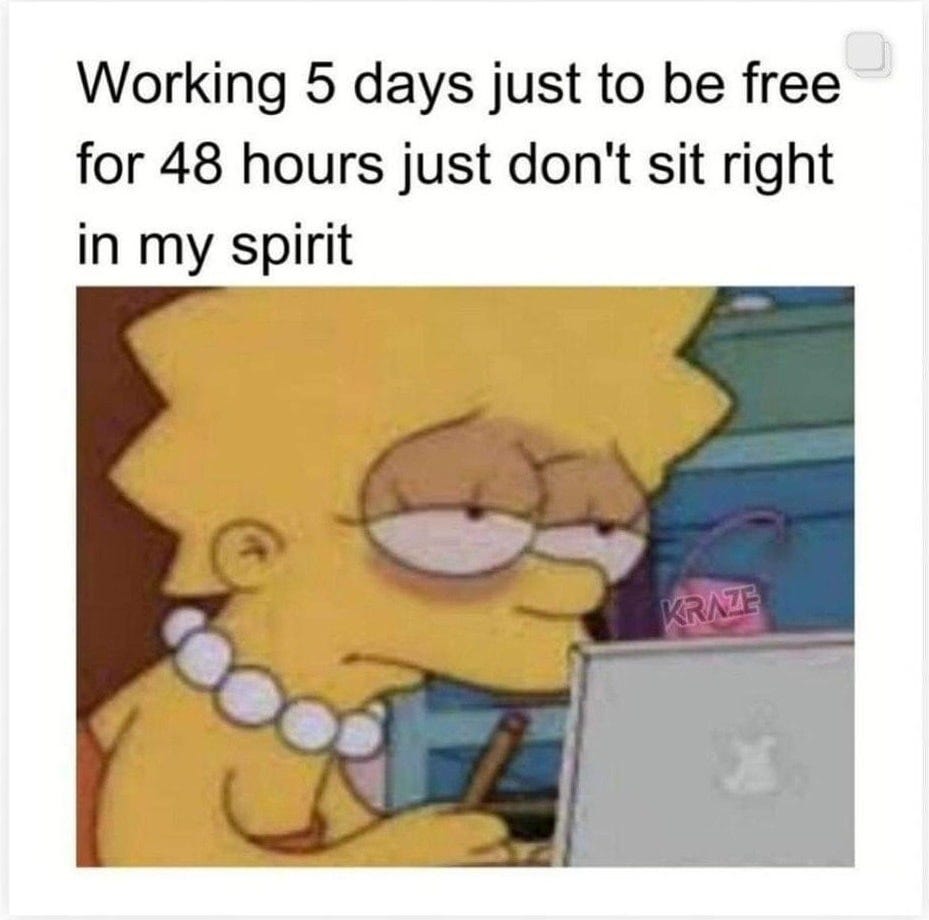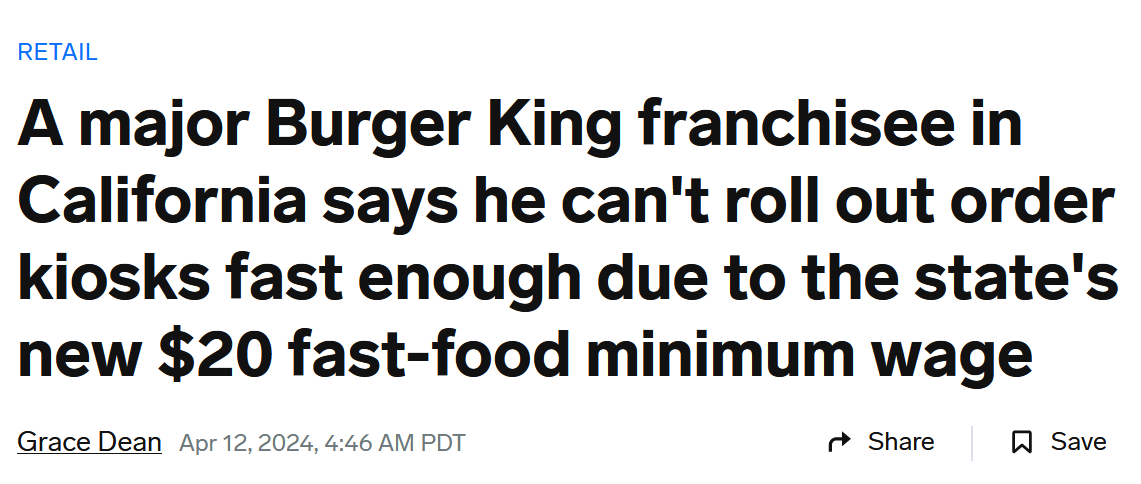A four-day workweek is more than reasonable, it’s moderate.
And it’s just the start.
You shouldn’t have to work this Friday. You shouldn’t have to work any Fridays. Or maybe it’s Monday you’d take off, if that’s how you’d like to schedule your four-day week. Seriously, right now there’s a bill sitting in the Senate to bring our workweeks down to 32 hours, with no loss in pay. It’s slightly unfathomable, and yet it’s real, it’s there. And it won’t pass. But Bernie Sanders has introduced legislation to make the four-day workweek a reality. Again, Congress will not turn this bill into law, at least not anytime soon, but the paradigm has shifted. I say that because it’s not just Bernie. It’s the United Auto Workers, it’s billionaire Steve Cohen, and it’s more and more organizations successfully implementing a shorter work week. And if you’re anything like me, the very thought of this shortened week makes you giddy, makes the butterflies jump around a bit in your stomach. What I wouldn’t do to work less, and have more time for the rest of life.
Studies on the four-day workweek have been conducted for a while now. They’ve all concluded that it’s great. Seriously, even the companies love it. In one U.K. study, 54 out of 61 companies that tried the shorter week were still doing it after a year. Now we know that companies like it for different reasons than workers, somewhat. They like the increased productivity that comes from workers feeling better and being healthier, rather than focusing on the worker well well-being in and of itself. But the fact that companies who try it embrace it is one big barrier out of the way, or it should be.
Yet most companies remain unwilling to try it, and massive industrial corporations have a slightly different calculus than most white-collar firms. They are more willing to churn through workers, allow workers to get injured, and generally care less about well-being. They also, simply put, rarely want to give up control over our lives. We saw this exact issue come up last fall when the UAW launched its historic strike. The new leadership of the union included the demand for a 32-hour workweek with no reduction in pay in their initial list, and while it wasn’t won in the tough contract battles, they haven’t given up. The increasingly strong auto workers union is still discussing it, and planning to push for it in the future.
But the thing is, working 32 hours should really be just the beginning. Over the past 80 years or so, worker productivity has gone up and up, meaning our work produces more and more value over time. But, while in the 1940s workers got about two-thirds of the value we produced in our paychecks, that number has come down dramatically.
I’ve written recently about how this increased productivity paired with taking home less and less of the value we produce reveals one of the inherent problems with capitalism, perhaps the single most fundamental issue, which is that workers don’t get what we produce. Instead the owners of our workplaces get to decide how much of the value we produce comes home in our paychecks. Salaries are discussed as a benevolent gift from the owning class, as bosses generously compensating us for our work, or at least being as generous as they can be. But the truth is that they’re giving us back only a fraction of the value we create. Even pointing that out is considered a radical left act today, but it’s simply the mechanics of capitalism. That is just how it works.
Few recent events have showcased the absurdity of how pay is discussed in our current system like California raising the minimum wage for fast food workers to $20/hr. Corporate media has responded by collectively losing its mind, and deciding to trot out one “small business owner” after another to say it’s simply impossible to pay people in accordance with the new law. These guys say they’ll be “forced” to automate jobs and fire workers and raise prices. But when we dig in just a little bit, a few key details are being left out of these stores. Let’s take one example.
You read this headline and are expected to think “Oh no, this minimum wage is too high, it’s going to cost workers their jobs!” Then, you dig into the article. And what you’ll see there is that this businessman owns tons of Burger Kings and makes millions, and is choosing to replace workers rather than pay them better. In fact, he “owns 180 fast-food restaurants in California, including about 140 Burger King locations and numerous Taco Bell and Popeyes restaurants.” These locations each typically make hundreds of thousands in profit. Each one makes an average of over $200,000. And so what owners are really saying is that they’re unwilling to make less profit. That is, as usual, what the panic of California’s new fast-food minimum wage comes down to. It’s what so much comes down to. Even when workers can barely afford to survive, capitalists are not willing to make less money.
Workers taking home the real value we produce would of course mean less money for the owners. And that’s exactly what it should mean. The capitalist premise that a handful of people deserve to take the value everyone else produces is silly, it’s absurd — which is exactly why it’s rarely discussed. Instead conversations are taken in ridiculous directions like bosses being “forced” to replace workers with machines. Something that is in fact a choice. A choice they do not have to make. But when the option of owners simply making less money is never allowed to enter the conversation, this is what we get.
Instead of nonsensical debate, we should be clear: the working class deserves all we create. The four-day workweek is just the tip of the iceberg, yet it rests on the clear assertion that we deserve to benefit from what we produce. And more than that it rests on the proclamation that we deserve real freedom, real pleasure, and a comprehensively better life. We know it’s just the beginning, but it’s an important beginning. Because we all deserve more time to be with family, we all deserve more time to pursue our passions, and we all deserve more time to relax and simply enjoy ourselves.
And ultimately, we deserve what we fight for. I can tell you that I believe we deserve the real freedom that comes with control over our lives, control over our jobs and workplaces, and real democratic control of our communities. But we don’t get what we say we deserve, we get what we are organized to take, we get what we build the power to create. So while billionaire Steve Cohen is saying the four-day workweek is coming, for him it’s on the horizon because of AI. To that I say other technological innovations have too often been used by bosses to take more without actually giving workers a bigger piece, as we’ve seen with automation. Instead I’ll go with Shawn Fain and the United Auto Workers, who say that we should have a four-day week because we should have better lives. Even more important the UAW is saying that the way to get it is by organizing and fighting for it, and that it’s just the beginning of the life we can and should have.

We’ve been taught that all this worker empowerment and “having a better life” stuff is unrealistic, but somehow 10 guys having as much money as four billion people is realistic and reasonable. It’s time to comprehensively reject that. This world is not “realistic,” it’s not sustainable, and it’s not practical. In fact a lot of the ways our system works are patently absurd, and they will not stand the test of time. They’re lopsided and unfair and detrimental to life itself. But a few people with a lot of resources have set things up to benefit themselves, at the expense of everyone else and the planet as a whole. Now, it’s time to change that. And to change it we need more time.
Like everyone else, I work too much. To change the world we need more time. We need time to organize, to learn, to teach, and simply to be with one another and not isolated in our respective factories and offices and service jobs. Working a little less is just the beginning, but it’s an important beginning on the path to real freedom, control over our own lives, and joy. I know that I’ll be fighting for it when the next contract comes up for my union, and I hope we can all organize, fight, and win improvements to our lives that allow us the time and energy to build a better world.





In the wake of the Great Recession, my full-time education job was reduced to .8. I was given the choice to work reduced hours every day or take a full day off. I chose to take Mondays off, and it was life-changing. The pay cut necessitated difficult changes, but the additional day to take care of the business of our lives woke me up to how unreasonable and unmanageable my job had become. I eventually went back to full-time work, but I was not the same full-time worker I had previously been. Our current wealth imbalance affects all work, not just for-profit industries. The only thing that trickles down is hardship for those expected to do more and more for less.
A shorter work week is better for workers, better for families, better for communities, and better for the Earth.
https://www.jphilll.com/p/a-four-day-workweek-is-more-than/
@newmeans